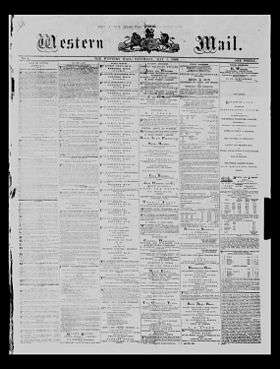Western Mail (Wales)
The Western Mail is a daily newspaper published by Media Wales Ltd in Cardiff, Wales owned by the UK's largest newspaper company, Reach plc. The Sunday edition of the newspaper is published under the title Wales on Sunday.
 Western Mail cover, 5 February 2005, day of Wales vs. England Six Nations Match | |
| Type | Daily newspaper |
|---|---|
| Format | Compact |
| Owner(s) | Reach plc |
| Editor | Alan Edmunds |
| Founded | 1869 |
| Headquarters | Six Park Street, Cardiff |
| Circulation | 10,341 [1] |
| Website | Walesonline.co.uk |

It describes itself as "the national newspaper of Wales" (originally "the national newspaper of Wales and Monmouthshire"), although it has a very limited circulation in north Wales.[2] The paper was published in broadsheet format until 2004, when it became a compact. It has an average circulation of 10,341 [1] down from over 40,000 in 2007.
History
The Western Mail was founded in Cardiff in 1869 by John Crichton-Stuart, 3rd Marquess of Bute as a Conservative penny daily paper designed to promote the Marquess' political aspirations.[3] Henry Lascelles Carr (1841–1902), editor since 1869, bought the paper with Daniel Owen in 1877. Under Carr, and later William Davies, the paper became influential in Wales.[3] Historically in South Wales the Western Mail has always been associated with its original owners, the coal and iron industrialists. Often this led to the paper being regarded with a considerable degree of enmity, especially during the strikes in the coal industry of the 20th century. This association between newspaper and its owner was so strong there is still a degree of distrust of the paper in South Wales.
In contrast, and particularly following devolution, the newspaper has adopted a populist, localist, pro-Wales stance, mainly in trying to find a Welsh focus on major news stories. The newspaper has also stressed the community issues such as the closure of Welsh schools.[4] The newspaper devotes a great deal of its coverage to Welsh rugby.
The paper has varied the amount of space given over to Welsh language coverage, but currently at least two full pages of Welsh are provided in the Saturday supplement.
In the 1950s Donald Woods, who later participated in the South African anti-apartheid movement and who publicised the events surrounding the secret death of activist Steve Biko, was employed as a reporter.[5]
See also
References
- "Circulation per issue" (PDF). Abc.org.uk.
- Minutes of the Welsh Local Government Association Co-ordinating Committee, 26 March 2004, Welsh Local Government Association, Archived 17 February 2012 at the Wayback Machine
- Davies, John; Jenkins, Nigel; Menna, Baines; Lynch, Peredur I., eds. (2008). The Welsh Academy Encyclopaedia of Wales. Cardiff: University of Wales Press. p. 616. ISBN 978-0-7083-1953-6.
- "Donald Woods". Telegraph.co.uk. 20 August 2001. Retrieved 12 March 2016.
